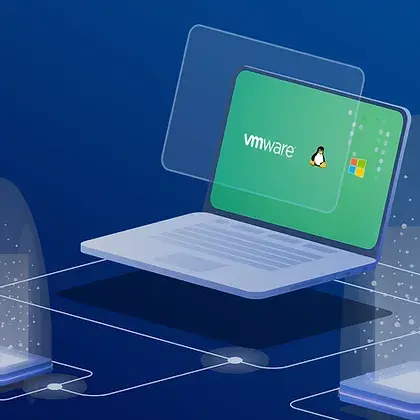
Bootable Hardware RAID NVMe Controllers for System Virtual Machine Applications
System Virtual Machine Solutions offer many advantages over conventional server platforms. VM technology enables a single off-the-shelf server to host multiple operating systems simultaneously, which can minimize an organization’s hardware footprint and the associated costs. Virtual Machine (VM) solutions utilize a software application to replicate the functions of a physical machine (such as a computing platform). This process is often referred to as “Virtualization”. System Virtual Machine solutions enable a single computing platform (the host server) to host multiple, independent installations of an operating system, commonly referred to as “VM’s” or “instances”.
A software suite (Hypervisor) is installed to the host server, and manages how clients (users) access each VM via a network or internet connection. Unsurprisingly, the speed and reliability of these connections is a primary concern. However, as each instance is essentially a software emulation of a physical hardware platform, the performance capabilities of the VM host's storage devices are of critical importance.

Modern VM platforms increasingly rely on NVMe storage for its compact form factor, high-reliability, and uncompromised performance. NVMe media can process exponentially more I/O requests than traditional SAS/SATA storage media. M.2 NVMe SSDs in particular, are capable of delivering exceptional random read transfer performance; ideal for VM applications designed to support a large number of remote users, each with their own unique workloads. However, not all NVMe storage solutions are suitable for VM applications. And of those that are, feature sets, cost of entry and performance levels can vary drastically. HighPoint’s NVMe Hardware RAID solutions offer the best balance of performance, reliability and TOC.
HighPoint SSD6200 Series NVMe Hardware RAID Solutions
HighPoint SSD6200 series Hardware RAID controllers are tuned to deliver exceptional random I/O performance - ideal for hosting bootable server configurations and Virtual Machine applications. The Hardware RAID engine delivers enterprise class redundant data protection and mirrored boot-volume capability, without taxing critical system resources. Driverless installation simplifies service and upgrade workflows and ensures VM platforms will remain online 24/7.
The compact single-width 2 and 4 port NVMe Hardware RAID controllers can be easily integrated into any computing platform with a free PCIe 3.0 or 4.0 x8 or x16 slot, and are compatible with both AMD or Intel based x86 motherboards. The SSD6200 series deliver the performance, reliability and feature set of an enterprise grade storage solution without the massive TOC associated with Tri-Mode controllers.
SSD6200 controllers operate independent of the host server and allow customers to avoid the drawbacks of onboard NVMe solutions, such as Intel’s VROC and AMD RAID, which are dependent on unique management suite and restricted to a particular software or hardware environment.
All RAID related calculations are processed directly by the controller hardware; this allows the VM Server Platform to devote the entirety of its of CPU and memory resources to the Virtual Machines and user workloads. Likewise, SSD6200 controllers require no Bifurcation support. The controller hardware architecture handles all lane allocation directly, and will distribute the maximum available bandwidth to each of the hosted NVMe SSDs.
Driverless Installation for a Wide Spectrum of Virtualization Platforms
SSD6200 series RAID AICs are natively supported by all major Virtual Machine including VMware ESXi, Citrix Hypervisor, Proxmox and Hyper-V, and current enterprise operating systems, such as Windows Server, Linux distributions and FreeBSD. This enables SSD6200 series controllers to function as plug-and-play hardware RAID solutions. No special procedures or software applications are required; SSDs and array hosted by SSD6200 series controllers will be automatically recognized by each platform’s default storage management interface and SDS suite. Native driver support also simplifies routine kernel updates and OS patches. Unlike non-native, unembedded devices, SSD6200 series will remain in operation throughout the upgrade procedure. Customers can rest assured that the VM platform and critical assets will remain accessible at all times, without fear of data loss or extended downtime.
Industry Most Comprehensive Pre-OS RAID Creation & Management Suite
SSD6200 series controllers include a comprehensive suite of pre-OS administrative tools designed to work in conjunction with a wide-range of motherboards and computing platforms. The suite is modular, and allows customers to select which tools are appropriate for the task at hand. Each utility works in isolation, but all can be installed simultaneously if desired.
The UEFI Tool is a non-graphical command line utility designed for use at the pre-OS level, and can be used to configure arrays prior to OS installation.
The UEFI HII (human interface infrastructure) compliant BIOS interface is natively supported by a wide range of server class motherboards and computing platforms. It enables the SSD6200 to inject RAID creation and maintenance options into the motherboard’s standard UEFI BIOS menu.
The WebGUI and CLI applications are installed via a single software package, and are designed for use at the OS level. The WebGUI is an intuitive graphical user interface that is compatible with any modern web browser. The CLI command line interface is designed for use with Linux and FreeBSD terminal and MS DOS windows. Both tools include a selection of advanced monitoring and management tools include SHI (storage health inspector) with active SMART monitoring and TBW tracking, and an Event Log with configurable Email Notification.
HighPoint’s H/W RAID Switch is a platform Independent Pre-OS RAID creation tool; instant RAID creation with zero learning curve! Administrators can configure an array prior to installing the controller using simple physical switches. The array will be recognized immediately upon installation of the controller by any modern AMD/Intel platform and hosted OS. Likewise, setting up a bootable array has never been easier – administrators can quickly configure a redundant RAID 1 boot volume using the H/W RAID switch; the array will be automatically recognized as a single physical volume by the OS setup procedure.

Enterprise Class Monitoring & Serviceability
HighPoint SSD6200 Series NVMe Host RAID Solutions empower administrators with an extensive selection of enterprise-class monitoring and management features designed to combat the threat of downtime by streamlining maintenance, field service and upgrade workflows. SSD6200A Variants feature bracket mounted LED indicators that are capable of tracking the status of the PCIe host connectivity and RAID configurations. We encourage those interested in learning more about the LED features and implementation to view the video walkthrough available here. SSD6200A Variants are also equipped with a secure out-of-band (OOB) management port and integrated console management interface. OOB is ideal for field maintenance and on-site services as it allows the RAID storage to be administered directly, independent of the host platform, and outside of the OS. SSD6200 controllers support HII; this enables administrators to remotely access host platforms that support the IPMI interface.

HighPoint Hardware RAID Solutions for VM Platforms
SSD6200 Seres NVMe Hardware RAID Controllers
SSD6200 Series Host RAID Controllers are the industry’s most cost-effective, bootable NVMe Storage solutions. The compact, 2 and 4 port NVMe Host RAID controllers support cost-effective, off-the-shelf M.2 SSDs of any capacity, can be easily integrated into any industry standard PCIe Gen3 or Gen4 PC server or workstation, and are natively supported by all major Virtual Machine and OS platforms, such as VMware, Proxmox and Hyper-V.

Quick Specs
Host Interface: PCIe 3.0x x8
Device Ports: 2x & 4x M.2
Form Factor: Single-Width, Half-Height /
Full-Height
.png)
